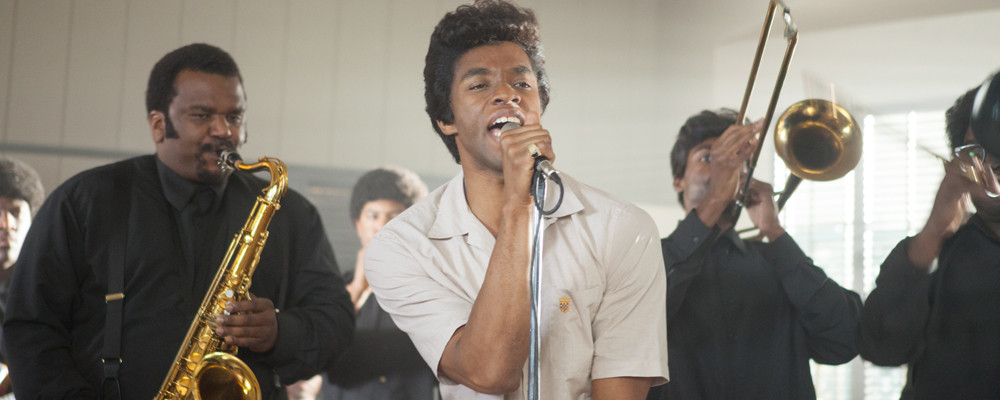‘Get On Up’ Unworthy of the King of Soul
Greg Vellante
There are so many film adaptations of literature out on the market these days that it’s always refreshing to see screenwriters adapt material that is a tad less predictable than The Hunger Games or Fifty Shades of Grey. With Get On Up, kudos is owed to screenwriters Jez and John-Henry Butterworth for taking the bold risk of adapting something a little bit different: The James Brown Wikipedia Page. While it may not be completely true to its source material, Get On Up is an interesting adaptation of…wait, it’s not an adaptation? Oh it’s actually based on the life of the Godfather of Soul James Brown? In that case, how can the film feel so lifeless and soulless, and why does scrolling through words on a web page sound just as appealing as actually watching this mediocre attempt at a musical biopic?
The screenplay of Get On Up feels like it was lifted from assorted fragments of encyclopedic James Brown knowledge, filtered and fused together with the wallpaper direction of The Help’s Tate Taylor. At an exhausting 138 minutes, Get On Up aimlessly travels from one point in Brown’s life and career to another, swapping between adult and childhood experiences with tonal imbalance.
The film begins with Brown’s notorious 1988 drugged-out car chase with police, then hops around like a spastic rabbit, resembling a feverish, meandering mess of a film. Most moments play out like reenactments of fact rather than grounded, believable, emotional scenes that one would expect to come from a movie such as this. A scene depicting a rough part of Brown’s childhood elicits no more of a reaction than, “Oh, that’s terrible that happened to him.” The scenes aren’t felt, they just sit there, equally dynamic to a Wikipedia excerpt recalling the same incident.
A film that should honor a legendary story of musical talent squanders everything it is based upon with supreme laziness. The majority of the production value seems as if it was poured into the film’s musical segments at large venues and in front of cheering crowds, but with all of that money nobody bothered to make sure that the sound design was adequate?
Chadwick Boseman plays the role with everything he’s got, but he fell short of mastering the artist’s signature singing styles. Therefore, the music of the film consists of actual recordings of Brown singing with an over-saturation of audience sounds mixed in while Boseman basically lip synchs and dances around the stage. Think about why Joaquin Phoenix worked so well as Johnny Cash in Walk the Line. He not only mastered the mannerisms of Cash but the singer’s unique vocals as well, thereby crafting an indelible performance as a notable personality. Here, Boseman only conquers half the battle.
Get On Up is certainly salvaged somewhat by its performances, with those on screen doing everything they can to work with the mediocre material and lackadaisical direction. Boseman definitely delivers but at a level that is significantly weaker from his brilliant, natural embodiment of Jackie Robinson in last year’s 42. Here, his performance feels more like impersonating than truly “becoming.” That isn’t to say that he isn’t entertaining to watch, and credit should be given to the hair and make-up department for enhancing Boseman’s performance with a great eye for detail.
True Blood’s Nelsan Ellis also gives a solid performance as Brown’s longtime partner Bobby Byrd. Great actresses Viola Davis and Octavia Spencer of The Help are wasted here with minimal performances as Brown’s childhood motherly influences, the former of which is abandoned in the middle of the movie only to circle back inexplicably just to give Davis one last chance to nail her Oscar submission for the year. While performances are interesting in the moment, and some scenes hold together better than others, Get On Up is still an unfortunate misfire in the realm of musical biopics.
What do you expect? They should have known that soul is impossible to replicate.

